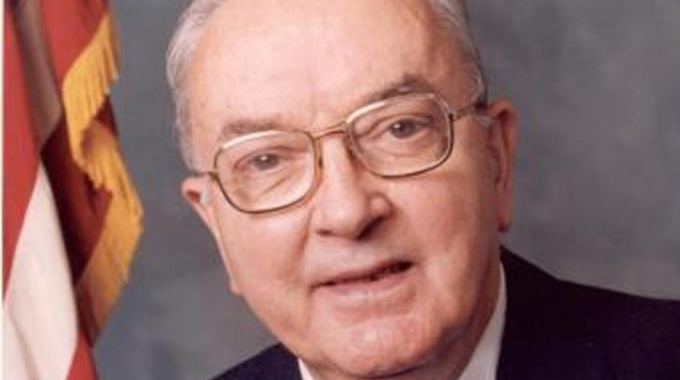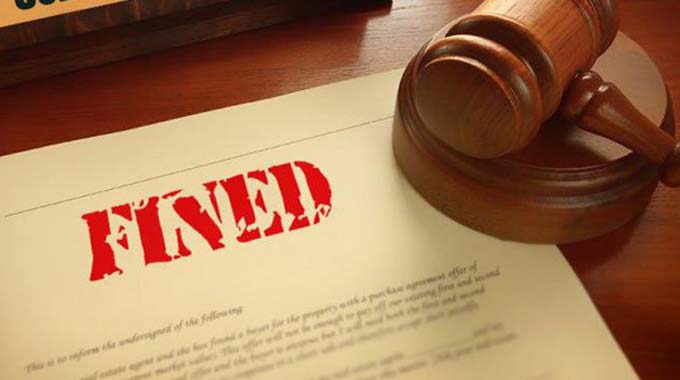Understanding Trump’s stinking land stance

Lovemore Ranga Mataire Senior Writer
DONALD Trump, the President of the United States is known for his hyperbole utterances.
Each time he opens his mouth or posts something on Twitter, the world gets worried.
In Trump’s world, Twitter or Facebook are convenient platforms to pronounce policies or declare war. One wonders whether he even reads reports from his own officials.
It seems his perspective of a myriad of issues is shaped by social media and in the latest development by Fox News.
In a recent tweet that is sure to worry many South Africans, President Trump said the State Department would probe “land and farm seizures . . . and the large scale killing of farmers”.
Trump’s tweet apparently followed a segment on the conservative Fox News about Pretoria’s plan to change the constitution to speed up expropriation of land without compensation to redress racial imbalances in land ownership.
The full tweet reads: “I have asked Secretary of State @SecPompeo to closely study the South Africa land and farm seizures and expropriations and the large scale killing of farmers.
“South African Government is now seizing land from white farmers.” @TuckerCarlson@FoxNews
South Africa hit back within hours on the government’s official Twitter account saying: “South Africa totally rejects this narrow perception which only seeks to divide our nation and reminds us of our colonial past.”
It further said the ANC government was to speed up the pace of reform in a careful and inclusive manner that does not divide the nation.
President Trump’s post must be viewed within the context of the Zimbabwean situation in which the US president recently signed the amended sanctions law on Zimbabwe.
Sadly, while Trump seems to be quick to come to the defence of white South Africans, he is blind and unconscious of the historical land disparities whose historical genesis is in apartheid and colonialism.
The point that needs to be illustrated is that far from alleged human rights violations, what is at the core of Trump’s concern in Zimbabwe and South Africa is the issue of land.
Zimbabwe is paying the price for embarking on land reform programme, and Trump’s tweet saves as a tacit warning to South Africa never to follow the example of their northern neighbours.
The issue of sanctions needs proper analysis and that analysis must begin with unravelling the characters or the original funders of the bill that gave birth to the Zimbabwe Democracy and Economic Recovery Act (ZDERA) of 2001.
This was an act by the United States Congress that imposed economic sanctions on Zimbabwe, allegedly to provide for transition to democracy and to promote economic recovery.
Some commentary would have the public believe that Trump’s recent signing of ZDERA had to do with the tragic events of August 1, when six people were killed when the army was deployed to quell riots in Harare. Not at all, the sanctions law was passed long before elections
We need to debunk a few myths regarding the sanctions.
First, there is the myth that sanctions would have been lifted had Zimbabwe held an election acceptable to all.
There is no guarantee that this would have done the trick. We need to unravel the demands of the amended sanctions law.
The US senators behind the law demanded to see a transparent poll, the presence of international observers, a free media open to all, a clean voters’ roll, free campaigning for all parties, among many other reasonable demands.
These are steps that any Government should take anyway, whether demanded by a foreign power or not.
These are the bare minimum for any country that, as Zimbabwe has done since President Mnangagwa came to power, aspires to be a democratic State that is “Open for Business”.
Simply because the US is demanding these steps to be taken does not devalue the fact that Zimbabweans in general and the Government of President Mnangagwa does not cherish the same aspirations.
It would thus be naïve to ignore the fact that these would have never been enough to stay Trump’s pen. In order for one to have a better understanding of what is at stake, one has to examine the politics of those that have sponsored the sanctions law way back in 2001.
On March 8, 2001, US senators Bill Frist and Russ Feingold introduced the bill. It was a bipartisan effort. While Hillary Clinton and Joe Biden are often credited as the architects of the bill, Senators Jesse Helms in 2001 and Jeff Flake in 2018 are the ones that anyone wishing to have a better understanding of the genesis of these sanctions ought to be concerned with.
Helms is one of the longest-serving US senators and was the arch-promoter of the sanctions bill.
If one critically looks at the original bill, the undeniable fact is that its fulcrum was and is on the land issue.
The demands to withdraw from DRC and the rule of law were convenient guises.
Many in Zimbabwe are unaware that the same Helms who was at the forefront of the bill at its inception was an avid supporter of UDI.
He was an unrepentant racist, who while campaigning for a candidate in the USA against a pro-integration candidate, ran an advert that said: “White people, wake up before it is too late. Do you want Negroes working beside you, your wife and your daughters, in your mills and factories? Frank Graham favours mingling of the races.”
That is not all. When the Civil Rights Act passed through Congress in 1964, removing discrimination against blacks, Helms denounced it as “the single most dangerous piece of legislation ever introduced”.
He described civil rights leader Dr Martin Luther King and his followers as “Communists and sex perverts”.
Interestingly, the same Helms who campaigned for sanctions against Zimbabwe, was also instrumental in rebutting sanctions against Rhodesia.
He tried without success to arrange a meeting between Bishop Abel Muzorewa and President Jimmy Carter in 1979.
His sole purpose was to sanitise Bishop Muzorewa as the legitimate leader of Zimbabwe-Rhodesia.
President Carter was reluctant to meet Bishop Muzorewa because his leadership was an affront even to the minimum dictates of a democratic dispensation.

Sen Flake
His election to power was condemned by many observers, but Helms still wanted Carter to endorse him.
Helms wrote to say: “by any objective standard” Rhodesia’s elections were free and fair.
After his failure to legitimise Bishop Muzorewa, the same Helms, together with Bob Dole, US presidential aspirant campaigned for the US to suspend its support of Mozambique and instead support Renamo, a rebel movement supported by apartheid South Africa.
The same Helms also agitated against the new black government in Zimbabwe in 1981 and even demanded cutting aid.
That’s not all. During Lancaster House Conference, Helms dispatched two of his aides to support Ian Smith’s delegation.
Is it so obvious that such an avid supporter of Rhodesia and Ian Smith would let the land reform go unpunished in Zimbabwe in 2000?
Although Helms died in 2008, his ultra-conservative ideals never went with him. The likes of Jeff Flake were to carry on with the legacy.
Flake, who together with Chris Coons, is one of the sponsors of this new ZDERA amendment, is no less colourful in the racial stakes than his mentor Helms was.
In 1987, Flake testified before the Utah State Senate in support of a resolution expressing support for the apartheid government of South Africa.
And here is more irony. While Flake today supports sanctions on Zimbabwe, Flake at the time said he opposed sanctions on the apartheid regime because they only worsened the living conditions for black South Africans.
So, while ordinary Zimbabweans matter little under sanctions today, ordinary South Africans had to be protected?
But while Flake has since tried to paint himself as a progressive conservative, evidence close to home points elsewhere.
This year, it was reported that Flake’s teenage son, Tanner, went by the name “n1ggerkiller” in an online game, and posted YouTube comments using the word “nigger”. Flake had to apologise on his son’s behalf.
With such history of Helms and Flake, it is no surprise that at the core of the new sanctions law is a demand for Zimbabwe to respect the SADC Tribunal ruling on land reform.
“It is the sense of Congress that the Government of Zimbabwe and the Southern African Development Community (SADC) should enforce the SADC tribunal rulings from 2007 to 2010, including 18 disputes involving employment, commercial and human rights cases surrounding dispossessed Zimbabwean commercial farmers and agricultural companies.”
The SADC Tribunal ruling is no insignificant matter on several accounts.
Firstly, it basically demands that white farmers be compensated for the land lost.
According to their unions, they want at least $30 billion for the land. The Zimbabwe government has promised only compensation for improvements, not the land itself.
Secondly, the SADC Tribunal made two more serious rulings.
First, that land reform was racially motivated and, therefore, discriminatory and illegal under the Constitution.
Secondly, that those affected must get back their land. The sum total, then, of anyone obeying the SADC Tribunal, is that land reform will be declared illegal and reversible.
This is never going to be possible, whether under the current Zanu-PF Government, or even under any current opposition party.
The demand for Zimbabwe to observe the SADC Tribunal ruling stands out among all the other demands in this amended sanctions bill. All other matters are there to make weight, in reality.
Whether it is today and Flake, an apartheid defender, or yesterday and Helms, a supporter of Rhodesia, the central demand has always been on land.
None of the parties in Zimbabwe today can deliver on that demand. None ever will.
The reality is that whoever takes charge of Zimbabwe, now or in the future, has to live with the reality of working under the punishment of US sanctions.
This is not about democracy, otherwise half the world would be under their versions of ZDERA.
South Africa seems to be the next target after Zimbabwe. It remains to be seen how Ramaphosa will handle these ultra-conservative vultures seeking to protect and preserve colonial disparities that favour whites.
The question is: are local opposition leaders who are supporting the continuation of sanctions really aware of what is at stake?
Anyone who thinks that this is just about free elections is either naïve or refusing to read history.









Comments